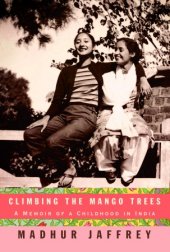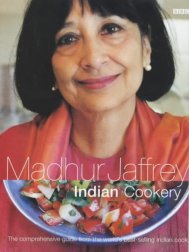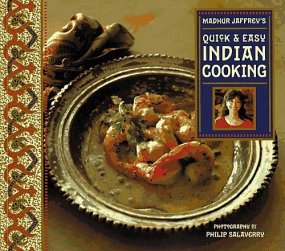A Culinary Childhood of Privilege
Climbing the Mango Trees; A Memoir of a Childhood in India, Madhur Jaffrey, 2006


Madhur Jaffrey is an author of Indian cookbooks and an actress who is said to have been responsible for introducing James Ivory and Ismail Merchant. Jaffrey appeared in a number of their earlier films: “Shakespeare Wallah” (1965, won Berlin Film Festival’s Best Actress), “The Guru” (1969), Autobiography of a Princess, (1976) and Heat and Dust (1983) directed by Ivory. And also “The Perfect Murder” (1988) and Merchant’s “Cotton Mary” (1999, title role).
She also appeared in “Six Degrees of Separation” (1993) with Stockard Channing (“Le Divorce”), Mary Beth Hurt (“Slaves of New York”) and “Vanya on 42nd Street” (1994) with Julianne Moore (“Surviving Picasso”), Larry Pine (“Hullabaloo Over Georgie and Bonnie’s Pictures”), Wallace Shawn (“The Bostonians”).

Here, Jaffrey writes about her family of the Hindu subcaste Mathur Kayasthas, administrators of justice and recorders of events. Her family worked in Delhi as administrators for the Mogul rulers until the British brought the capital to Delhi when they went to work for the British. As a reward for their loyalty to the British in a time of Indian uprisings they were given a large parcel of land on the Yamuna River. The patriarch turned down a choice of land in New Delhi saying “Who wants to live in that jungle”. Jaffrey ruefully notes that property in New Delhi today is worth as much as property in London. Her family was so extensive that a picnic or celebration might be attended by 300 or more relatives. Her father headed a number of companies during her childhood.
To escape the heat of summer the family spent summers in the “hill stations” Dalhousie. After partition they often went to Simla. This was a custom started by the British.
Born is 1933 Jaffrey was 12 at the end of WWII and 14 at the time of India’s independence and partition (into Hindu India and Muslim Pakistan). She notes that many Indians were killed in WWII (but seemingly no one known to her or her family). Millions were killed during partition and tens of millions were displaced from their homes. She notes that a number of her privileged Muslim classmates left for England or Pakistan. Delhi swelled from a million inhabitants to over ten million, mostly impoverished refugees. Jaffrey notes that all the taxis were now driven by Sikhs and restaurants started offering tandoori oven meats and breads, kabobs, lassie (a yogurt drink) and other Punjabi culinary delights. She left India to study acting a few years after partition and has lived in England and the United States since.
This book gives a good picture of what it is like to grow up privileged and insular. The India she describes is a picture book India of good times and good food taking place during the key years of the Congress party struggle for independence with Gandhi and Nehru risking imprisonment; of the British forcibly enlisting Indians to fight in Burma and Europe for the British in WWII; of the rise of the Muslim League and the tragic British partition of India as the British left India behind. Like privileged classes everywhere, her childhood memories contain very little of this life and death struggle, the poverty, the displacement, the terror of this time. Money and privilege buys an insulation from these larger realities. What did she really think of the tumultuous times of her childhood? We don’t know from this book.